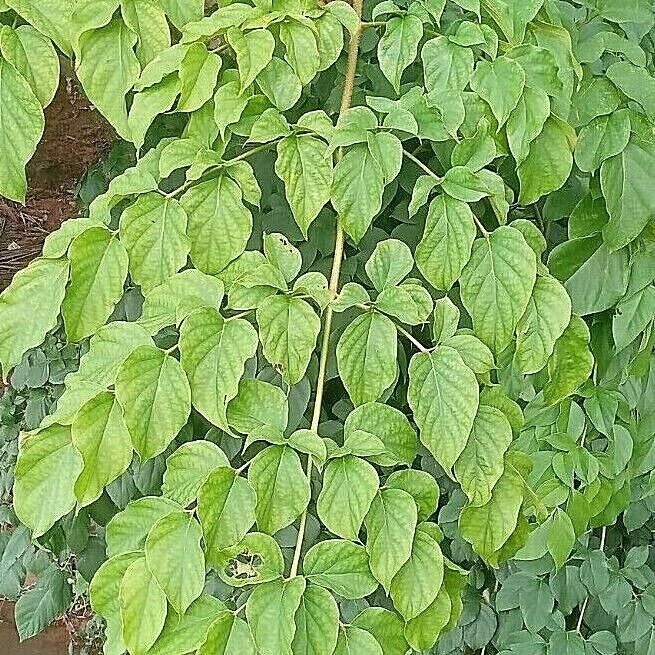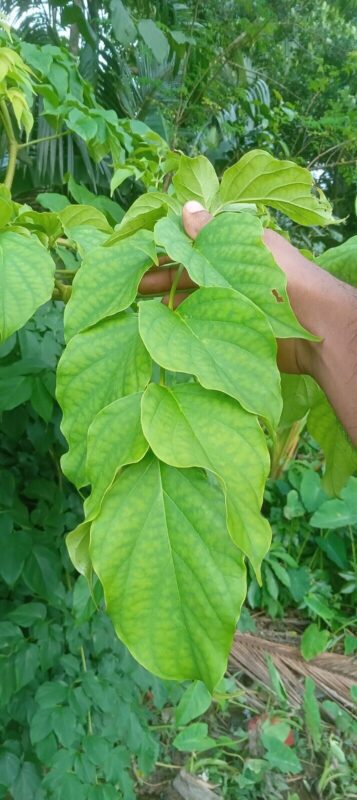Blog
Shyonaka Benefits: The Ayurvedic Power of the Midnight Horror Tree (Oroxylum indicum)

Imagine walking through a tropical forest at dusk. As the world settles into silence, a strange and wonderful tree comes to life. It unfurls large, trumpet-shaped flowers that bloom only at night, their scent attracting nocturnal pollinators. By morning, the flowers have fallen, carpeting the ground below. From its branches hang long, woody pods that look like swords, clattering in the wind with a sound like broken bones.
This isn’t a scene from a fantasy novel. This is the daily life of Oroxylum indicum, a tree with a collection of names as dramatic as its appearance: the Midnight Horror, the Tree of Damocles, and the Broken Bones Plant.
But behind these spooky names lies one of the most revered herbs in Ayurvedic medicine. In the world of wellness, it’s known as Shyonaka. Here in Sri Lanka, we call it Totila (තොටිල). It’s a plant that perfectly marries folklore with profound healing, and today, we’re uncovering the science and tradition behind its powerful benefits.
A Tree of Many Names: A Global Herbal Treasure

The sheer number of names for this plant speaks to its importance across cultures. Understanding them is key to appreciating its global significance:
- Ayurvedic Name: Shyonaka (or Syonaka). This is its most important name in the wellness world, connecting it to thousands of years of medical tradition.
- Botanical Name: Oroxylum indicum. The universal scientific identifier, essential for accurate research.
- Common English Names: Midnight Horror Tree, Broken Bones Plant, Tree of Damocles, Indian Trumpet Flower.
- Hindi: Sonapatha or Shyonak.
- Sinhala (Sri Lanka): Totila (තොටිල).
- Malay: Bonglai.
These names tell a story—of its appearance, its sound, and most importantly, its power.
The Ayurvedic Powerhouse: Shyonaka’s Role in Dashamula
To truly understand Shyonaka, you must know about Dashamula. This is one of the most famous and foundational formulas in Ayurveda, a synergistic blend of ten powerful roots (Dasha = Ten, Mula = Root). Dashamula is the ultimate remedy for balancing Vata dosha, the energy associated with movement, the nervous system, and processes like breathing and circulation.
Shyonaka is one of these ten sacred roots.
In Ayurvedic texts, Shyonaka is celebrated for its potent medicinal properties:
- Shothahara: It’s a powerful anti-inflammatory, helping to reduce swelling and edema throughout the body.
- Vedanasthapana: It’s an analgesic, renowned for its ability to alleviate pain.
- Deepana & Pachana: It stimulates appetite and aids digestion, helping to fire up the body’s metabolic processes.
Because of these properties, Shyonaka is a cornerstone ingredient for addressing a host of conditions, from joint pain to respiratory distress.
Key Health Benefits of the Midnight Horror Tree
While its role in Dashamula is key, the bark, roots, and leaves of the Midnight Horror Tree are used in many traditional preparations for their targeted benefits.
1. A Natural Ally for Joint Health and Pain Relief
This is perhaps Shyonaka’s most celebrated benefit. Its potent anti-inflammatory and analgesic properties make it a go-to herb in Ayurveda for managing conditions like arthritis, rheumatism, and general body aches. It works to reduce the swelling and stiffness that cause discomfort, promoting better mobility and comfort.
2. Soothing the Respiratory System
Shyonaka is a trusted friend to the lungs. It acts as an effective expectorant, helping to loosen and expel phlegm from the respiratory tract. This makes it a valuable traditional remedy for coughs, colds, bronchitis, and even providing support for asthmatic conditions by helping to clear the airways.
3. Champion of Digestive Wellness
In Ayurveda, a healthy digestive fire (Agni) is the key to all health. Shyonaka is known to stimulate this fire. It’s traditionally used to relieve indigestion, bloating, and loss of appetite. Its astringent properties also make it effective in managing diarrhea and dysentery.
4. A Guardian for the Liver
The liver, our primary organ of detoxification, gets a lot of support from Shyonaka. It’s considered a hepatoprotective herb, meaning it helps protect liver cells from damage caused by toxins and infections. Traditionally, it’s used as a liver tonic to support overall function and aid in recovery from liver-related ailments.
Modern Science and the Midnight Horror

It’s always exciting when modern science begins to validate ancient wisdom. Researchers have identified numerous bioactive compounds in Oroxylum indicum, including flavonoids and alkaloids, that exhibit significant antioxidant, anti-inflammatory, and antimicrobial properties, providing a scientific basis for its many traditional uses.
From Spooky Story to Superfood
The journey of the Midnight Horror Tree is a fascinating one—from a plant with a name that sparks spooky campfire stories to a revered medicinal powerhouse. As Shyonaka, it has earned its place as a pillar of Ayurvedic medicine, offering a natural path to relief and wellness. It’s a powerful reminder that sometimes, the things that seem strange and mysterious on the surface hold the most profound secrets to health.
Disclaimer: This article is for informational and educational purposes only and does not constitute medical advice. The information provided is based on traditional uses and available literature. Always consult with a qualified healthcare professional or certified herbalist before using any herbal product, especially if you are pregnant, nursing, or taking other medications.

Oroxylum indicum seeds
Oroxylum indicum root
Oroxylum indicum flower
Oroxylum indicum bark
Oroxylum indicum wood
Oroxylum indicum medicines
Discover more from Nath Mart
Subscribe to get the latest posts sent to your email.
